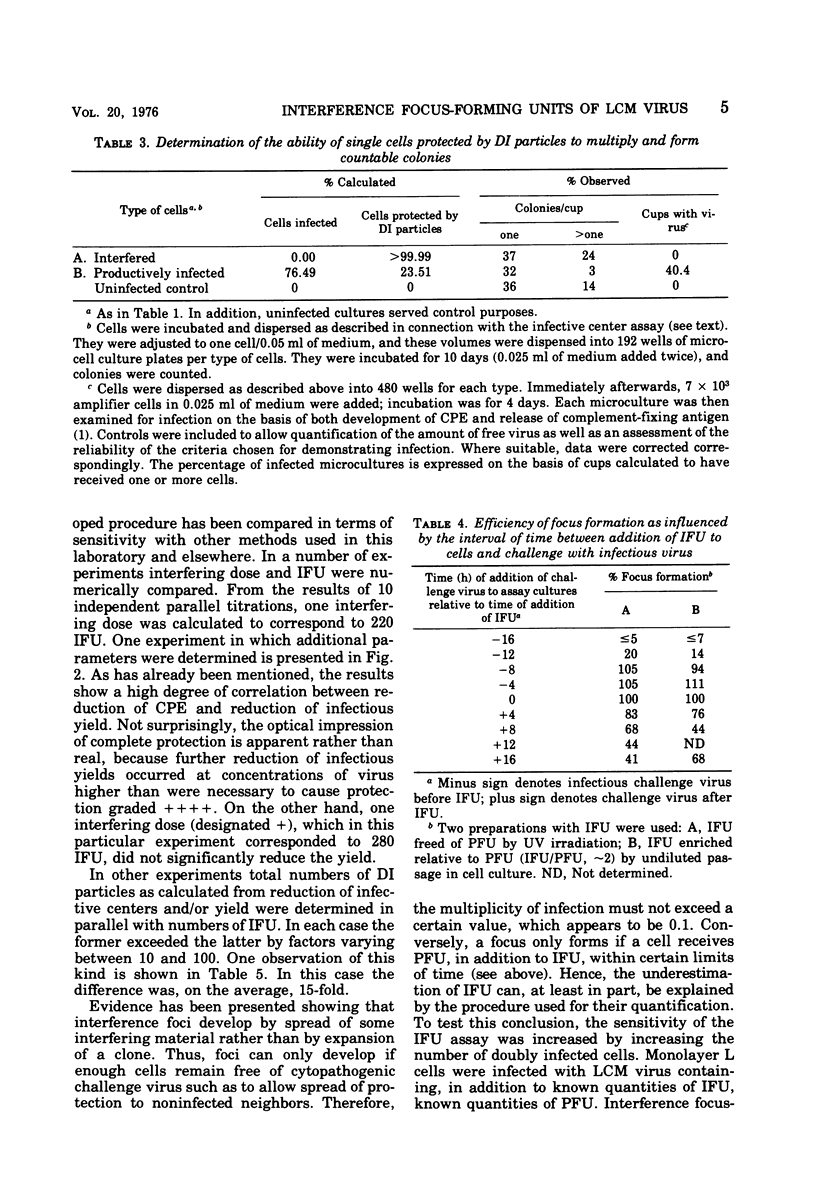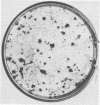Abstract
Lymphocytic choriomeninigitis (LCM) virus defective interfering (DI) particles form foci of protected cells in a monolayer under an agarose-containing overlay medium. Foci originate from one cell dually infected with at least 1 interference focus-forming unit and infectious virus. As a result, an interfering factor is produced and released which interacts with neighboring cells, thereby protecting them against cytopathic lysis by challenge virus. The property of individual LCM virus DI particles to induce countable foci has been made the basis of quantitative assay that is comparable in every respect to the plaque assay of infectious virus and is much more sensitive and probably more accurate than other procedures used to measure LCM virus DI particles. LCM virus was passaged, undiluted, 10 times in cell cultures. When yields were analyzed as to concentrations of PFU and interference focus-forming units, both entities were found to fluctuate with the pattern expected from theoretical considerations.
Full text
PDF







Images in this article
Selected References
These references are in PubMed. This may not be the complete list of references from this article.
- Gschwender H. H., Lehmann-Grube F. Micromethod for the titration of lymphocytic choriomeningitis virus in cell cultures. J Gen Virol. 1975 Feb;26(2):205–208. doi: 10.1099/0022-1317-26-2-205. [DOI] [PubMed] [Google Scholar]
- Hotchin J. Slow viruses and neurological damage. Monogr Hum Genet. 1972;6:172–181. doi: 10.1159/000392687. [DOI] [PubMed] [Google Scholar]
- Huang A. S., Baltimore D. Defective viral particles and viral disease processes. Nature. 1970 Apr 25;226(5243):325–327. doi: 10.1038/226325a0. [DOI] [PubMed] [Google Scholar]
- Huang A. S. Defective interfering viruses. Annu Rev Microbiol. 1973;27:101–117. doi: 10.1146/annurev.mi.27.100173.000533. [DOI] [PubMed] [Google Scholar]
- Palma E. L., Huang A. Cyclic production of vesicular stomatitis virus caused by defective interfering particles. J Infect Dis. 1974 Apr;129(4):402–410. doi: 10.1093/infdis/129.4.402. [DOI] [PubMed] [Google Scholar]
- Popescu M., Lehmann-Grube F. Diversity of lymphocytic choriomeningitis virus: variation due to replication of the virus in the mouse. J Gen Virol. 1976 Jan;30(1):113–122. doi: 10.1099/0022-1317-30-1-113. [DOI] [PubMed] [Google Scholar]
- Welsh R. M., O'Connell C. M., Pfau C. J. Properties of defective lymphocytic choriomeningitis virus. J Gen Virol. 1972 Dec;17(3):355–359. doi: 10.1099/0022-1317-17-3-355. [DOI] [PubMed] [Google Scholar]
- Welsh R. M., Pfau C. J. Determinants of lymphocytic choriomeningitis interference. J Gen Virol. 1972 Feb;14(2):177–187. doi: 10.1099/0022-1317-14-2-177. [DOI] [PubMed] [Google Scholar]
- von Boehmer H., Lehmann-Grube F., Flemer R., Heuwinkel R. Multiplication of lymphocytic choriomeningitis virus in cultivated foetal inbred mouse cells and in neonatally infected inbred carrier mice. J Gen Virol. 1974 Nov;25(2):219–228. doi: 10.1099/0022-1317-25-2-219. [DOI] [PubMed] [Google Scholar]




